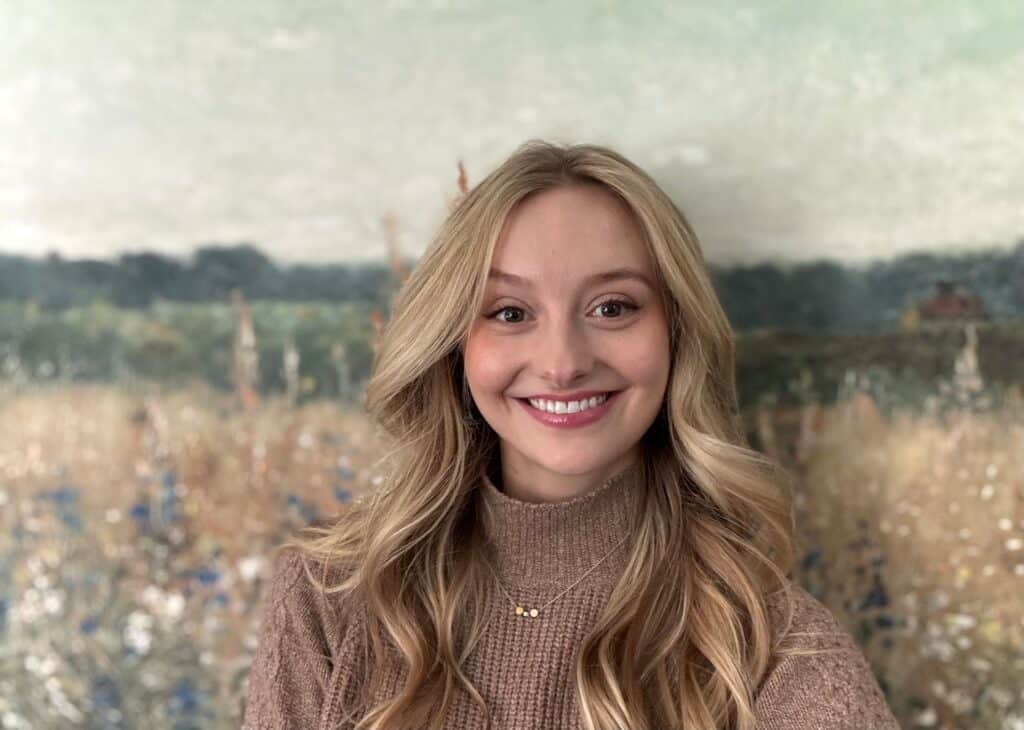
Chelsea Moore is a psychotherapist at Wildflower. In her clinical practice, Chelsea draws on Acceptance and Commitment Therapy, the Neuroaffective Relational Model, and Cognitive Behavioral Therapy. Chelsea works with adolescents, adults, couples, and family structures experiencing stressful transitions, anxiety, mood disorders, complex trauma, sexual challenges, and relationship issues. Chelsea has experience in helping clients identify and break free from unhelpful patterns of behavior using relational, somatic, and mindfulness-based interventions. She obtained her Master’s degree in Social Work at Loyola University Chicago. Read Chelsea’s full bio here.
What inspired you to pursue a career as a psychotherapist?
My journey to becoming a therapist was shaped by a combination of personal growth and professional exploration. I’ve always felt drawn to roles centered on helping others and creating meaningful connections. My own experiences in therapy taught me the transformative power of being truly seen and heard, inspiring me to offer that same space to others.
While living in Chicago, I became involved in advocacy work, which deepened my understanding of the systemic influences on our collective mental health and reinforced my desire to support individuals on a more personal level. These experiences guided me to pursue psychotherapy as a way to unite my passion for mental health and social justice with my commitment to fostering purposeful growth through authentic connection.
As a psychotherapist, what part of your job is most satisfying?
There are so many satisfying parts of being a therapist. However, my favorite moments are when clients develop greater insights about themselves and feel more empowered as a result.
How would you describe your therapeutic approach?
The therapeutic alliance is at the heart of my approach. I believe that healing happens within the context of safe, supportive relationships, and the therapeutic relationship is a uniquely powerful space for fostering long-term growth and transformation. I prioritize getting to know my clients as whole individuals, beyond their presenting concerns or diagnoses, to create an atmosphere where they feel deeply understood and valued. While my approach is rooted in a relational framework, I also integrate insights from neurobiology, mindfulness, and somatic practices to help clients expand their mental health toolkit and connect with their inner resources.
Why do you believe that psychotherapy can help?
I believe psychotherapy can help because it provides a unique space where individuals feel seen, heard, and valued. Therapy isn’t about fixing someone; it’s about walking alongside them on their wellness journey and helping them tap into their resilience and strengths. With the right support, people can gain clarity, heal, and move forward with an increased capacity for connection.
What are some of your specialties and what drew you to them?
I specialize in complex trauma, relationship challenges, and life transitions. I practice a relational form of therapy which stems from my deep curiosity about how relationships and personal experiences shape us. I’m passionate about helping clients navigate challenges related to intimacy, identity, and emotional healing because I believe these are core aspects of living a fulfilled and values-centered life.
What is one thing about psychotherapy you wish everyone knew?
Therapy is a process that requires self-compassion, patience, and a willingness to show up for yourself, even when it’s challenging. It can be as much about discovering joy, purpose, and meaning as it is about addressing pain and hardship. Healing isn’t linear, and it often involves moments of discomfort and vulnerability. However, the wonderful thing about therapy is that you don’t have to go through the process alone. Part of my role as a therapist is to provide a safe, supportive container for the many ups and downs of the journey. It’s a space where you can feel empowered to explore who you are and who you want to become.
What is your motto or personal mantra?
As a big Lord of the Rings fan, I draw inspiration from Gandalf’s words of wisdom: “It is the small everyday deeds of ordinary folk that keep the darkness at bay. Small acts of kindness and love.” In a world that often makes us feel powerless, this reminds me that even the smallest actions can create meaningful change. My clients prove this to me every day—each step they take, no matter how small it may seem, is a testament to their extraordinary capacity for growth and transformation.
What are your favorite self-care activities?
I love going on a long walk, cuddling with my two cats, and getting lost in a really good book, movie, or TV show!

